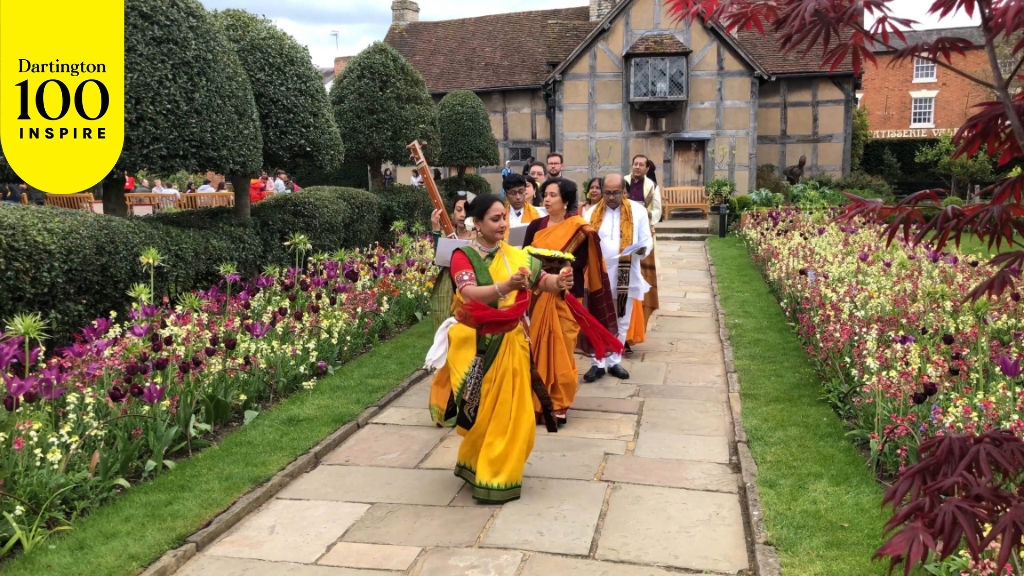
On 5 May 2025, acclaimed Bengali cultural group Prantik and the Dartington Trust are inviting audiences to a special performance – Dartington 100: The Rabindranath Tagore Connection.
In this extraordinary cultural celebration, which also marks Nobel laureate Rabindranath Tagore’s 164th birth anniversary, singers, musicians and dancers from Prantik will bring to life the enduring vision of Nobel laureate Rabindranath Tagore in the magnificent Great Hall of the Dartington Estate. It will reveal the inspiration for the “Dartington experiment” through a carefully curated selection of his timeless songs and profound poetry about the universal themes of humanity, love and nature. It will include new, rhyming English translations by Prasenjit Saha that make Tagore’s genius accessible to contemporary audiences.
As Leonard Elmhirst himself acknowledged, without Tagore’s influence Dartington would never have existed. Through this unique performance, Prantik invites you to discover or rediscover the transformative power of Tagore’s art while celebrating the cross-cultural exchange and innovative thinking that defined his school in Santiniketan, the Institute of Rural Reconstruction in Sriniketan and Dartington.
“This performance by Prantik, which includes performers who grew up in Santiniketan, offers a creative opportunity to explore the connection between Rabindranath Tagore and Dartington founders Dorothy & Leonard Elmhirst”, said Dartington Head of Arts and Cultural Events, Urszula Kossakowska.
“We are honoured and thrilled to be back in Dartington to share the story of Tagore and the Elmhirsts through songs, music and dance in the special setting of the Great Hall”, added Prantik Co-Founder Obhi Chatterjee.
About Rabindranath Tagore
Rabindranath Tagore was a multifaceted genius who was born on 7 May 1861. He was celebrated, initially in his native Bengal, as a poet, playwright, songwriter, author, philosopher, humanist and social reformer. Later in life, he also created a dance style known as Rabindranritya and established an international reputation as a painter. He transformed Bengali literature and music, introducing modern styles and forms that blended traditional and contemporary elements.
In 1913, he won the Nobel Prize for Literature, making him the first non-European to win a Nobel Prize.
He was a visionary educator who founded a school and university in Santiniketan, promoting a holistic approach to education. His advocacy of social reform and his critique of colonialism and nationalism made him a significant figure in India’s intellectual and cultural renaissance.
In 1921, he invited Leonard Elmhirst to help him establish the Institution of Rural Reconstruction in Sriniketan. Their pioneering approach to rural development became a model for rural communities across India and provided the inspiration for the close connection between Dartington Arts School and its surrounding communities.
Tagore’s compositions include the national anthems of India and Bangladesh. His life and work continue to inspire people worldwide with themes of universal humanity and cultural harmony.
About Dartington
The Dartington Estate is set on a beautiful 800-acre estate in the South Devon countryside. It is centred on its medieval Great Hall, Courtyard and Grade II* Listed Gardens.
The “Dartington Experiment” began in 1925, when Dorothy and Leonard Elmhirst bought a crumbling estate and began to explore how a place could change the world – attracting some of the greatest artists, educators and political philosophers of the 20th century in the process. Important British institutions – including the NHS and the Arts Council – emerged, and ground-breaking experiments in land use, farming and education took place.
The Elmhirsts understood that the world and its people are complex. There are many sides to every story and to every human being. We need environments that encourage our whole being to flourish, in connection with nature and each other.
